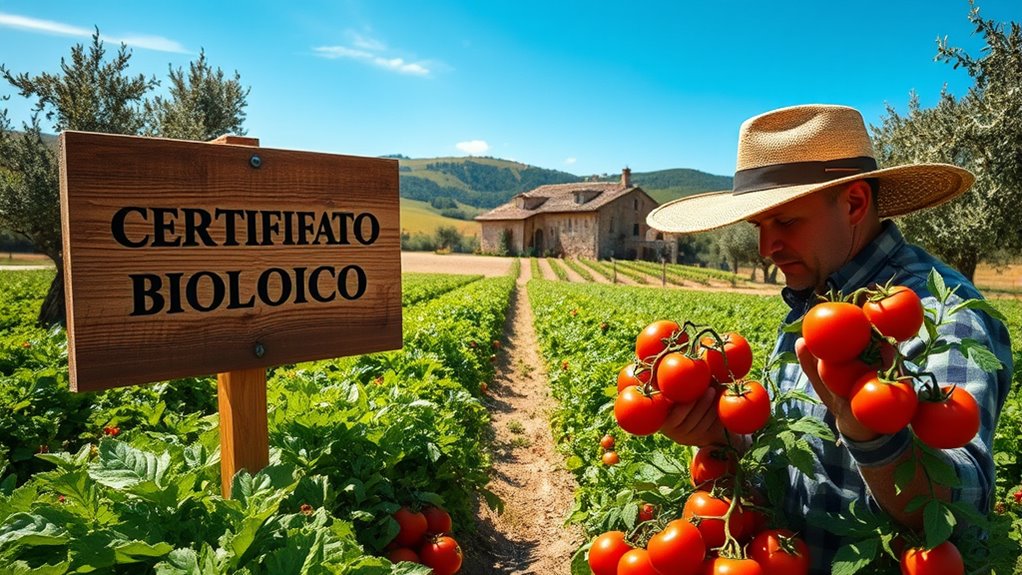Understanding organic certifications in Italy shows how each step—from farm to fork—is regulated to guarantee your food is healthy, sustainable, and safe. Farmers must meet strict standards through inspections that verify eco-friendly practices, animal welfare, and organic inputs. Labels like the Italian and EU organic logos guarantee authenticity and quality. This system promotes transparency and traceability, giving you confidence in your choices. Keep exploring to learn how these certifications truly support sustainable farming and protect your health.
Key Takeaways
- Organic certifications in Italy ensure products meet strict quality, environmental, and sustainability standards through authorized inspection processes.
- Certification involves farm audits verifying adherence to EU and national organic regulations on inputs, practices, and record-keeping.
- Labels like the Italian and EU organic logos guarantee compliance, transparency, and consumer trust throughout the supply chain.
- Sustainable farming principles such as crop rotation, composting, and pest management promote soil health and biodiversity from farm to fork.
- Certification enhances traceability, preventing fraud, and empowering consumers to make ethical, environmentally responsible food choices.

Italy has established a robust system of organic certifications to guarantee that products meet strict standards for quality and sustainability. This system is designed to ensure that farmers and producers adhere to practices that prioritize environmental health, animal welfare, and consumer safety. When you buy organic products in Italy, you’re supporting a certification process that emphasizes sustainable farming methods—techniques that minimize chemical inputs, protect soil health, and conserve water resources. The goal is to produce food that’s not only healthy for consumers but also beneficial for the planet.
The certification process in Italy begins with farmers and producers applying through authorized certification bodies. These organizations conduct thorough inspections and audits to verify compliance with national and European Union organic standards. During these inspections, they examine farm management practices, input usage, and record-keeping to ensure adherence to sustainable farming principles. You should know that sustainable farming isn’t just a buzzword; it’s a core component of the certification. It involves crop rotation, composting, integrated pest management, and the avoidance of synthetic fertilizers and pesticides. This approach helps maintain soil fertility, reduces pollution, and promotes biodiversity, all of which are crucial for long-term environmental health. Additionally, the emphasis on offensive security measures ensures that the integrity of the certification process is maintained against potential fraud or tampering.
Once a farm or producer passes the inspection, they receive an organic certification that must be renewed periodically. This renewal process ensures ongoing compliance and encourages continuous improvement. Certification labels, such as the Italian organic logo or the EU organic logo, are then displayed on packaging, giving you confidence that the product meets high standards. These labels are more than symbols—they’re guarantees that the product was produced under strict regulations emphasizing sustainable farming practices.
You also benefit from the transparency and traceability embedded in Italy’s certification system. You can trace the product back to its origin, knowing it was produced with respect for the environment and animal welfare. This traceability system helps prevent fraud and ensures integrity within the organic market. As a consumer, you’re empowered to make informed choices, supporting farmers who prioritize sustainability and ethical practices.
Frequently Asked Questions
How Does Italy Verify Organic Certification Compliance on Farms?
Italy verifies organic certification compliance on farms through strict inspection procedures carried out by certified agencies. You’ll find that these agencies conduct regular on-site inspections, review records, and guarantee adherence to organic standards. They also verify that farming practices align with organic regulations. If you’re a farmer, you must cooperate with these inspections and maintain proper documentation to stay certified, ensuring your farm meets all organic certification requirements.
Are Imported Organic Products in Italy Equally Regulated?
Yes, imported organic products in Italy are equally regulated. They must meet strict standards, including compliance with EU organic standards and the imported standards set by the country of origin. Certification overlap guarantees these products are thoroughly checked, verifying their organic status. You can trust that imported organic products undergo rigorous verification processes, just like domestic ones, ensuring they meet Italy’s high-quality organic criteria.
What Is the Cost Difference Between Organic and Conventional Farming?
Think of organic farming as planting seeds of patience and care; it often costs more than conventional methods. Your cost comparison shows higher expenses for organic practices, but this can lead to better profit margins if marketed well. While conventional farming might be a quicker, cheaper path, organic farming nurtures quality and sustainability, making the investment worthwhile. The balance between cost and profit is delicate but essential for long-term success.
How Long Does Organic Certification Approval Typically Take?
The certification timeline for organic approval typically takes around 6 to 12 months, depending on your farm’s size and compliance history. During the approval process, you’ll need to submit detailed documentation and undergo inspections. It’s important to be patient and thorough, ensuring all standards are met. Once approved, you’ll receive your certification, allowing you to market your products as organic and meet consumer demand confidently.
Can Consumers Verify Organic Certification Status in Real Time?
Yes, you can verify organic certification status in real time through digital verification tools provided by certifying bodies. These platforms ensure certification transparency, allowing you to access up-to-date information about organic products. By entering product codes or certification numbers online, you get instant confirmation of a product’s organic status. This empowers you to make informed choices and supports trust in organic labels, guaranteeing you’re buying genuinely certified organic products.
Conclusion
Understanding organic certifications in Italy is like guiding a well-marked trail—you’ll find clarity and confidence along the way. By recognizing the labels and standards, you ensure your food is authentic and sustainable. So, next time you shop, remember these certifications are your map, guiding you to healthier choices. With knowledge like this, you can confidently support local farmers and enjoy the pure, rich flavors Italy offers—like a fresh breeze on a sunny day.









